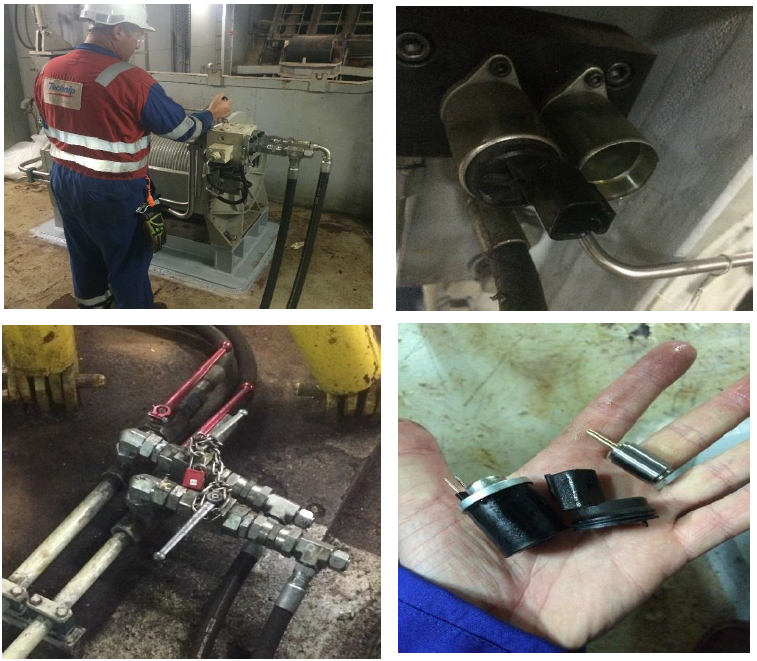Stored pressure release near-miss: Small part expelled from hydraulic winch
A member has reported an incident in which a part was expelled from a hydraulic system under pressure, causing a leak of hydraulic oil. The incident occurred when the hydraulics were activated to turn the winch drum to install a new wire rope. There was a loud bang from the hydraulic pack as a sensor was forced out of the unit. The sensor hit the bulkhead to the right. Approximately 2 litres of hydraulic oil was also expelled from the winch onto the deck and bulkhead.

Our member’s findings were:
- Company safe system of work had not been followed – there had been no permission or sanction to test this equipment;
- The hydraulic system had not been commissioned properly. The hydraulic hoses had been fitted the wrong way around;
- The handover between technicians following crew change had not identified these issues.
Our member’s recommendations were:
- Improve communication between crews at handover especially at crew change;
- Formal ‘sanction to test’ should be completed before it is handed over to the responsible person in charge;
- Suitable and sufficient risk assessment and pre-use check list to be created and used for this work and equipment;
- Status and condition of equipment should be clearly defined before planned maintenance is carried out.
Members may wish to refer to the following incidents (search words: ‘safe system’, hydraulic):
- Hydraulic company sentenced after employee loses sight in one eye
- Near-miss: Contained hydraulic oil spillages from cranes
Both incidents relate to inappropriate release of stored hydraulic pressure in which a causal factor was failure to follow a safe system of work.
Safety Event
Published: 4 July 2016
Download: IMCA SF 18/16
IMCA Safety Flashes
Submit a Report
IMCA Safety Flashes summarise key safety matters and incidents, allowing lessons to be more easily learnt for the benefit of all. The effectiveness of the IMCA Safety Flash system depends on Members sharing information and so avoiding repeat incidents. Please consider adding safetyreports@imca-int.com to your internal distribution list for safety alerts or manually submitting information on incidents you consider may be relevant. All information is anonymised or sanitised, as appropriate.
IMCA’s store terms and conditions (https://www.imca-int.com/legal-notices/terms/) apply to all downloads from IMCA’s website, including this document.
IMCA makes every effort to ensure the accuracy and reliability of the data contained in the documents it publishes, but IMCA shall not be liable for any guidance and/or recommendation and/or statement herein contained. The information contained in this document does not fulfil or replace any individual’s or Member's legal, regulatory or other duties or obligations in respect of their operations. Individuals and Members remain solely responsible for the safe, lawful and proper conduct of their operations.
